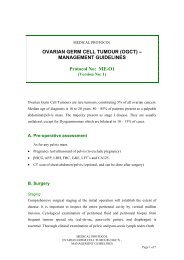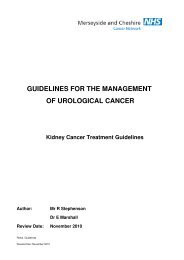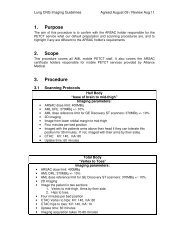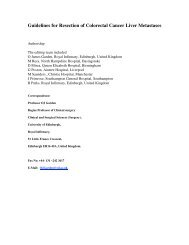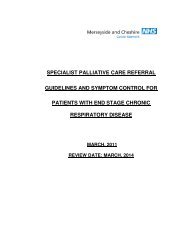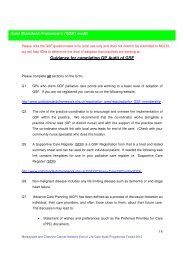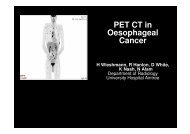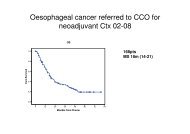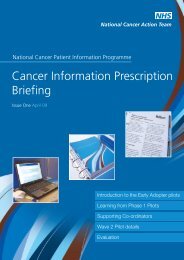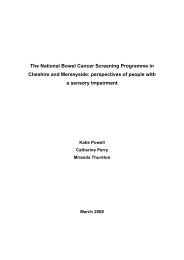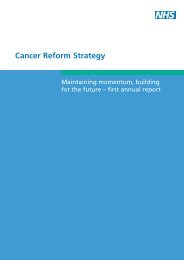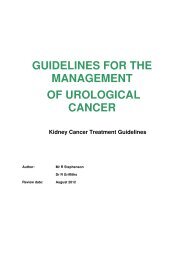Cancer Reform Strategy - NHS Cancer Screening Programmes
Cancer Reform Strategy - NHS Cancer Screening Programmes
Cancer Reform Strategy - NHS Cancer Screening Programmes
- No tags were found...
You also want an ePaper? Increase the reach of your titles
YUMPU automatically turns print PDFs into web optimized ePapers that Google loves.
CHAPTER 11: BUILDING FOR THE FUTURE 12711.13 Between 1999/2000 and 2005/06 thenumber of CT scans undertaken each year on<strong>NHS</strong> patients has increased by 83% (from 1.36million to 2.48 million). MRI activity hasincreased by 99% (from under 600,000 to over1.1 million). The latest monthly figures from thenational diagnostic data collection, part of the18 week pathway monitoring, shows themedian wait for an MRI scan was four weeksand the median wait for a CT scan was twoweeks in September 2007.11.14 Despite this progress, England is stillbelow the international average for both accessto MRI and CT scanners and further progresswill be necessary if we are to deliver the visionof world class cancer services outlined in thisstrategy. For example OECD estimates suggestthat in 2004, the UK had 5 MRI scanners permillion of population compared to aninternational median of 6.7. Similarly estimatessuggest that the UK had 7 CT scanners permillion of population, compared to a medianof 14. 5411.15 The National Framework for theDevelopment of PET-CT Services in England waspublished in October 2005 and recommendedthat provision should be made for 40,000 scansper annum for cancer patients across England by2010. A series of initiatives have already beenput in place to enable the <strong>NHS</strong> to reach thislevel. Currently 21,000 scans are undertakeneach year and this figure will double whenindependent sector contracts becomeoperational early in 2008. A UK PET-CT AdvisoryBoard has been established which will keep theuses of PET-CT under review and ensure thatthere is a controlled expansion of these services.11.16 In keeping with the broad thrust of thisstrategy, we do not propose to set new targetsfor the further expansion of cancer relatedfacilities. Instead, we will monitor the outputsand outcomes – both in terms of the numbersof procedures undertaken each year and inrelation to the achievement of the waiting timestandards outlined in earlier chapters. This willenable both providers and commissioners tobenchmark local provision against nationalaverages. The Department of Health will alsocontinue to benchmark progress in Englandagainst international good practice and advisecommissioners accordingly. Commissioners willneed to work with providers to ensure that theyhave appropriate capital investment strategiesthat enable older equipment to be replaced.Sufficient finance will be made available to the<strong>NHS</strong> as part of their general capital allocationsto fund investment in new cancer equipment.11.17 In addition to the provision of modernequipment, attention needs to be given to theoverall physical environment in which care isdelivered. <strong>Cancer</strong> patients have to attend clinics,day case units and/or radiotherapy departmentson multiple occasions over a period of weeks,months and years. Some of the day caseattendances may take several hours, for exampleto receive a prolonged infusion ofchemotherapy. The quality of the physicalenvironment in which such care is delivered canaffect a patient’s overall experience of care.Some groups, for example children and youngpeople, will have particular needs and should betreated in an environment appropriate to them.11.18 People affected by cancer deserve to betreated and supported in physical environmentswhich meet high quality standards. Althoughthe investment of recent years has improvedthe environment for patients and staff theimprovement needs to continue and besustained. We will work with patientgroups to develop a ‘kitemark’ for goodcancer facilities. Commissioners will beencouraged to take the quality of thephysical environment into account whenmaking service planning decisions andinformation on the quality of facilities willbe made available to patients through <strong>NHS</strong>Choices (www.nhs.uk).Good horizon-scanning11.19 Thanks to high quality research, the paceof change in cancer can be rapid. It is thereforevital that we have in place good quality horizonscanning,enabling us to identify and plan forthe opportunities and challenges of the future.11.20 The expert groups convened todevelop the site specific visions for cancer



